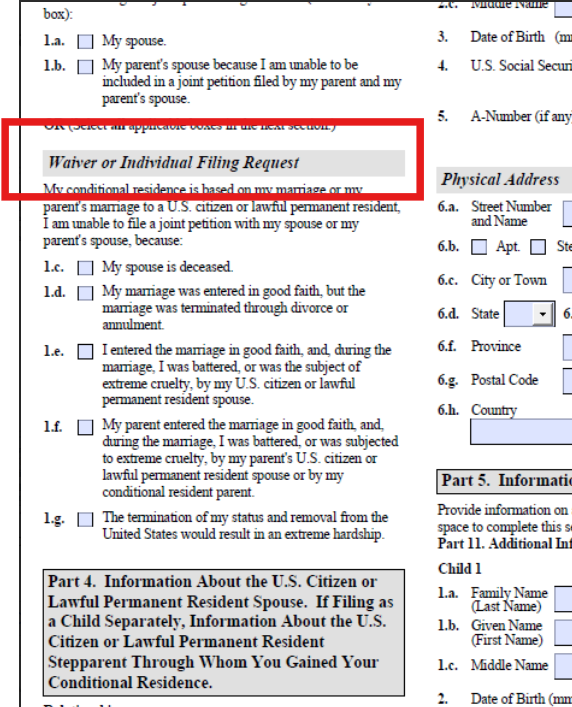Divorce is never easy, and when your immigration status is involved, the process can be difficult to navigate. Whether you have a conditional 2-year green card, a 10-year permanent green card, or are still in the process of applying for a green card, divorce raises important questions about your future status. In this post, we’ll explore options after divorce, no matter which type of green card you hold.
Here are a few handy shortcuts:
- Divorce on a conditional green card
- Divorce on a permanent green card
- Divorce during Immigration Process (I-130, I-485)
Speak to a qualified VisaNation attorney to understand your options after divorce.
What Happens to a Green Card After Divorce?
After a divorce, you may need to take extra steps to ensure that you can extend your lawful permanent resident status or plan for citizenship. A divorce does not automatically revoke your green card unless there is evidence of fraud.
Depending on the type of green card you have, the path forward will vary:
|
Situation |
Divorce on Conditional Green Card (2 years) |
Divorce on Permanent Green Card (10 years) |
|
Effect on green card |
No immediate impact on your green card status |
No impact on your green card status |
|
Renewal of green card |
You must file a waiver within I-751 and provide evidence the marriage was entered in good faith. |
No impact, you can renew after ten years. |
|
Eligiblity for citizenship |
You must wait five years from green card issuance instead of three for citizenship |
You must wait five years from initiial green card issuance instead of three for citizenship |
|
Risk of scrutiny |
High level of scrutiny from USCIS |
Low level of scrutinity from USCIS |
Understand the Green Card Types: CR1 Vs IR1
Before continuing, it’s important to understand the different types of marriage green cards:
- The CR1 green card applies to those who have been married for less than 2 years.
- The IR1 green card applies to those with a marriage of 2 years or more.
Below, we’ll explore the impacts a divorce has on both green cards in detail:
Divorce On Conditional Green Card (CR1)
What happens if you get a divorce before the end of the two-year conditional green card period? If you have a CR1 green card, you will still need to file the Form I-751, Petition to Remove Conditions on Residence. Because of the divorce, this form does not require your divorced spouse’s signature.
However, an added step means you must submit an I-751 waiver and select one of five options that best match your situation:
- My spouse is deceased
- My marriage was entered into in good faith
- I entered the marriage in good faith, but I was subject to extreme cruelty by my spouse
- I entered the marriage in good faith, but I was subject to extreme cruelty by my parents’ spouse
- The termination of your status and removal from the U.S. would result in extreme hardship
If you find yourself in this scenario and the final order of divorce is obtained before the conditional green card period ends, then you will need to demonstrate to USCIS that there is a valid reason to bypass the joint filing requirement.
This must be done by demonstrating that the marriage was bona fide to begin with – not a marriage used solely for immigraion benefits.
What evidence can you use to prove the marriage was entered into in good faith? Here are a few examples:
- Documents showing joint ownership of property or a common residence
- Evidence proving that finances were intermingled, such as a joint bank account
- If children were born from the marriage, their birth certificates
- Affidavits from friends or parties who can testify to the legitimacy of the marriage
If your evidence is not compelling and the USCIS finds that the marriage was not legitimate, your case will likely be rejected.
Consult with a qualified immigration attorney who can offer guidance for your specific situation
✅ Backed by a 4.9⭐ Google rating and 15+ years of immigration law experience.
Additionally, the divorce on a CR1 will impact your citizenship timeline.
-
You will no longer be eligible for the more favorable 3-year citizenship.
-
You must instead wait until you’ve had your green card for 5 years
When to File Your I-751 Form
You will need to file Form I-751 (Removal of Conditions) with a waiver for joint filing within 90 days of the expiration of your conditional permanent resident status.
What Happens After the Submission of The I-751 With a Divorce Waiver?
After submitting your I-751 with a divorce waiver, the USCIS sends you a notice of receipt. This will contain with on how to proceed with your application process.
This will give you the eligibility to continue living and working in the United States and travel internationally while waiting for the final approval of your green card.
Submitting Evidence to Support Your Waiver Request
When filing a waiver for the I-751 petition (Removal of Conditions) after divorce, it’s important to submit evidence demonstrating that your marriage was entered into in good faith.
USCIS does not determine eligibility based on who was at fault for the end of the relationship. The primary concern of USCIS is to determine whether the marriage was genuine in the beginning.
Here are some examples of evidence to include:
- Disagreements related to differences (i.e., child-rearing, finances, etc.) This is what’s known as a no-fault green card divorce.
- Attempts to reconcile (i.e., marriage counseling). If there was an effort on your part to seek marriage counseling or another form of reconciling help, you can supply invoices from the session. This will help the USCIS see that the marriage was bona fide, to begin with.
- The burden of the fault lies with the ex-spouse. If the divorce was due to your spouse’s alleged adultery, imprisonment, or another relevant reason, you could provide affidavits from people in your life familiar with the situation.
It is important to note that this list is not exhaustive. Consult an immigration attorney to learn about other types of evidence that may be appropriate when contemplating a green card after divorce.
Divorce on Permanent Green Card (IR1)
If you have an IR1 green card, divorce has little to no impact on your green card.
However, it has an impact on the citizenship timeline:
With an IR1 green card, you can apply for citizenship after 3 years from green card issuance, but with a divorce, you must now wait 5 years from the date you became a permanent resident to apply for naturalization.
What Happens if You Divorce During the Immigration Process?
If you divorce during the green card immigration process, this generally ends the marriage-based green card application, if it wasn’t already approved. The foundation of a marriage-based green card application is marriage, so without a valid marital status, the case cannot continue.
Divorce After I-130
Because the I-130 application form is only the beginning of your immigration journey toward a green card, there is nothing legally binding you to the U.S. Therefore, you will be unable to continue pursuing your green card if you and your spouse get divorced.
However, if you already have legal permanent residency, then divorce after green card approval will not impact your status. This will only be an issue should you apply to obtain U.S. citizenship through naturalization.
Divorce During Adjustment of Status
Divorce during the adjustment of status stage (filing the I-485 form) can jeopardize the marriage-based green card application if it wasn't already approved. The Adjustment of Status relies on a valid, ongoing marriage, however, there are exceptions, such as under VAWA (Violence Against Women Act).
Example:
XYZ job sponsors you for an employment-based adjustment of status. Your wife and child are a part of the applications as dependents. However, during the process, you and your wife get divroced. As she is no longer your spouse, she no longer qualifies as a derivative beneficiary. You would need to notifiy USCIS of the change, as she is no longer eligible to adjust status through your green card applcation. Your child is fine.
Divorce After Adjustment of Status
If a divorce happens after the adjustment of status application for both the principal and derivative beneficiaries has been approved, then the divorce will not affect the green card application.
This means that, when the green card is available, both the principal and derivative beneficiaries will have their green card, regardless of the divorce that has happened. The USCIS will likely not have any reason to review the case again.
However, there may be some issues if the end result is a conditional green card. This is because the divorce will cast doubt on the authenticity of the marriage in the first place.
For this reason, the conditional resident green card holder will have to file an I-751 form with a waiver for joint filing, as explained above. You will have to prove to the USCIS that the marriage was entered into in good faith in the first place and not solely to obtain a green card.
Watch the video below to hear VisaNation Attorney, Shilpa Malik, break it all down regarding the responsibilities you may still hold towards your immigrant spouse after a divorce.
What Happens If You Marry a U.S. Citizen and Then Divorce?
Filing I-751 Waiver Before Finalizing Divorce
If you’ve received a final decree of divorce or annulment, you have the flexibility to file Form I-751 regardless of how close you are to your conditional green card’s expiration date. In situations where you are separated but your spouse is unwilling to jointly file the I-751 form, you’ll need to proceed on your own.
To accomplish this, you’ll have to apply for a waiver to bypass the joint filing requirement. This waiver necessitates that you provide proof demonstrating.
- You entered the marriage in good faith from the beginning.
- The divorce is finalized, unless in cases of abuse/hardship
Conditional Green Cards and Divorce vs. Legal Separation
A legal separation differs from a divorce in that it doesn’t officially dissolve a marriage. Instead, it serves as a formalized agreement that both parties are leading separate lives.
In the eyes of immigration law, the couple remains married because the marriage has not legally ended. Consequently, the non-citizen spouse may still be eligible for a permanent green card, even if the couple is living apart.
A divorce is when the marriage is completely dissolved.
However, there’s a specific exception. If the couple resides in a jurisdiction where a legal separation automatically converts into a divorce after a certain period, then the non-citizen spouse may not qualify for permanent residency under the same terms.
At VisaNation, we ensure that your application is properly filled out and that you don’t suffer from additional waiting time to fix filing mistakes.
Let VisaNation make the green card process easy for you.
How to File I-751 Without a Final Divorce After Abuse
If your divorce is not yet finalized and you or your child was subject to battery or abuse from the U.S. citizen spouse, you may be able to bypass the divorce waiver. In this case, you must file Form I-751 with a waiver based on abuse/battery.
The waiver for abused spouses, parents, and children is under the Immigration and Nationality Act (INA) as amended by the Violence Against Women Act (VAWA). This applies to both men and women.
Green Card Marriage Divorce FAQs
What Happens If You Submit an I-751 Past The Deadline?
If you are late when applying, the USCIS will automatically terminate your conditional resident status and commence removal proceedings against you.
A notice will be sent to you to inform you of your failure to remove the conditions. You will also be sent a “Notice to Appear” at a hearing, where you will have the chance to review and rebut the evidence against you.
For your late application to receive approval, you will have to prove in writing to the director of the USCIS Service Center that you have a genuine reason for submitting late. The director will decide to either approve your petition and restore your permanent resident status or not.
The key takeaway: to avoid losing your immigrant status, apply within the 90-day period.
Will I be deported If I leave my partner?
If you are already under a non-conditional lawful permanent resident status, you will not be deported for leaving your husband or wife. If you become a U.S. citizen, you will have complete immunity from deportation in most circumstances.
How long after my green card can I divorce?
Getting a divorce before obtaining your green card or before having the conditions on your 2-year green card removed can be a difficult situation. However, once you have a 10-year green card, you will be able to get a green card divorce without jeopardizing your lawful permanent resident status.
How long after citizenship can you divorce?
As the spouse of a U.S. citizen, you can file for naturalization after 3 years of obtaining your green card, but during that three-year period, you must be living with your spouse, your spouse’s citizenship status can’t have changed, and you must still be married until you get full citizenship. Should you get divorced in that period, you’ll have to wait five years to file for citizenship instead of three.
What about remarriage after a green card divorce?
If you already have your 10-year green card and you get a divorce, you are free to remarry whoever you wish without impacting your status. However, if you have not yet gotten your green card or your green card still has conditions on it, then you will either have to file a waiver and prove the above criteria or you will have to marry another U.S. citizen and have them serve as your new sponsor, effectively starting the process over again.
Can I divorce after getting a 10-Year green card?
Yes. Once your conditions have been removed, you will not need to be married to a U.S. citizen to maintain your status. However, you will be unable to pursue U.S. citizenship unless you have been married to a citizen for a certain amount of time. It is best to consider this if citizenship is your goal.
How long will it take to get my marriage green card?
Depending on whether you applied via consular or in the U.S., the timelines can range anywhere from 6 months to 3 years. Fortunately, marrying a U.S. citizen classifies you as an immediate relative of that citizen, meaning that immediate relative green cards are always available.
Can I get a green card through if my spouse abandoned me?
If your spouse abandoned you and you are without a green card or status, then you may be eligible to self-petition under VAWA.
Does getting a divorce affect my permanent resident status?
No, if you are a permanent resident with a ten-year green card, then getting a divorce will not affect your status.
Can I cancel my spouse’s conditional green card?
This question has a two-fold answer. The U.S. citizen spouse can cancel or withdraw their I-130 (petitioning for you) but they cannot cancel your I-485. You may be eligible to file a VAWA self-petition if your spouse has demonstrated emotional or physical abusive behavior during your relationship.`
Am I financially responsbile for my spouse if we are seperated?
Yes, you may still be financially responsible for your spouse even if you are separated. As the sponsor on Form I-864, you legally agreed to support your immigrant spouse to ensure that they don't become a "public charge."
NOTE: Whether your green card was sponsored by a U.S. citizen ex-spouse or through any other route, you should remember that divorce will always carry some red flags concerning your eligibility for naturalization. By the time you submit the N-400 form, the USCIS will review your immigration history, including the green card application process. Because of the divorce, they will likely scrutinize your petition even further.
During your naturalization interview, you may be asked a few questions about the circumstances that led to the divorce. You may also be asked to provide additional evidence to prove your marriage wasn’t fraudulent. If you are unable to convince the officers with strong supporting evidence, your application may be denied.
 Sabrina Saada
Sabrina Saada  Shilpa Malik
Shilpa Malik 

